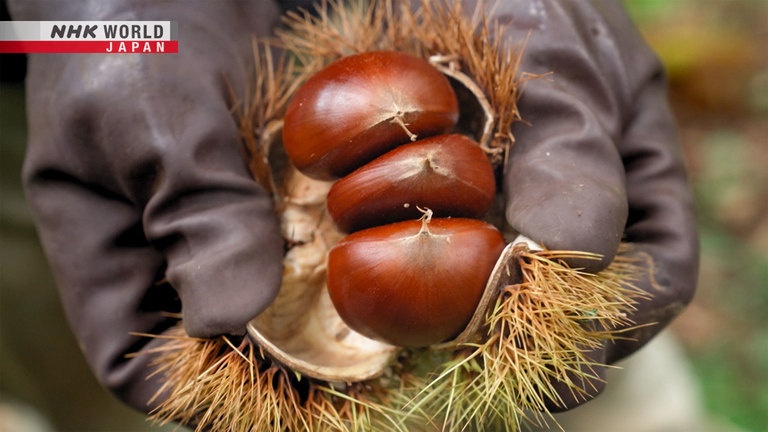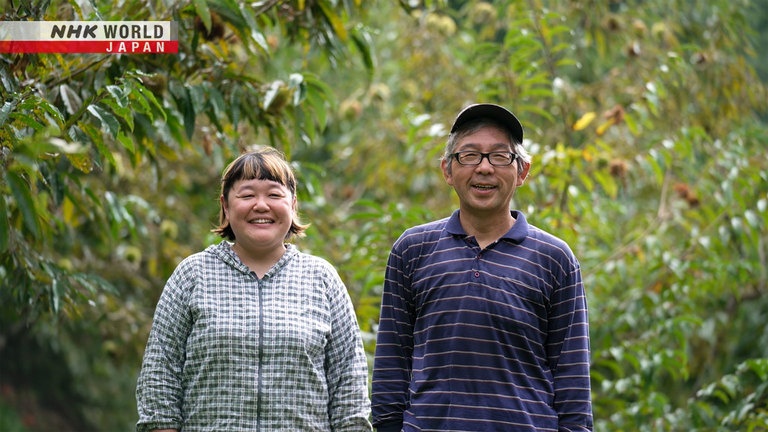Finding Myself in Satoyama
Rie left Tokyo to get married in a rural village. Running a chestnut farm and welcoming people with her unique cooking, her life changed drastically.



Transcript
Chestnuts are grown with great care.
This farmer, also a cook, creates bold, original cuisines, that utilize the blessings of the mountains.
I love it when people say, "The mix
of ingredients is surprisingly good."
Born and raised in Tokyo, her life changed drastically when she moved to this farming village.
I drifted from job to job
and wasn't getting anywhere.
I felt saved after coming
here to live closer to nature.
Let's follow her story, by looking through the kitchen window.
Ehime Prefecture, located on the island of Shikoku in western Japan, enjoys a mild climate.
Here in "satoyama," a Japanese term for a woodland area between the mountains and the city, is a village with a population of about 270.
Kameoka Rie, aged 46, is a chestnut farmer.
She moved here from Tokyo seven years ago to get married.
This is our garden plot.
Every day, we pick up
chestnuts that fall off the trees.
Our harvest this year
is rather bountiful.
When I find nice,
plump ones, I'm overjoyed.
Some are really big, like these.
Her husband, Kazuhiko, is 60 years old.
He's a second-generation chestnut farmer, born and raised in the area.
My father planted
these chestnut trees.
I remember clearing this
mountain area with him.
I like farming. No one
tells me what to do,
and I work on my own terms.
We've got sextuplets.
Six babies. It's rare.
This one's triangular,
and this one's flattened.
Chestnuts are harvested over two months in the fall.
On a good day, the couple gathers 200 kilograms of chestnuts.
After the day's work is done, it's time to cook.
They eat the cracked, unsellable chestnuts.
- How's the taste?
- It's the same.
But their value decreases
if they're cracked.
The chestnut's shell is called "demon skin," and is tough to remove.
Since long ago, this region has employed a special tool.
I first used one when I got
married and moved here.
It gets the job done.
She will make steamed chestnut rice.
Seasoned with only sake and salt, it's a classic autumn dish in Japan.
While the rice cooks, she prepares "nikujaga," a meat and potato stew.
This is wild boar meat.
Our friends catch it
and give it to us.
Sharing between neighbors is a tradition in "satoyama" villages.
Rie and Kazuhiko are often in the kitchen together.
I cook most of the fish dishes.
I also go fishing and gut the fish.
- I'm a good cook.
- Sure, probably better than me.
They get along well, but sometimes have different opinions.
This is sugar.
I receive "suggestions"
to make my dishes sweeter.
People around here like sugar.
Her "nikujaga" needs more of it.
Thank you for the food.
The soft texture of the chestnuts coupled with their mild sweetness is a culinary delight.
The chestnuts are awfully good.
- How is it?
- The boar doesn't taste gamey.
Could be sweeter.
It's sweet enough.
It feels natural.
It's as if I've been
living like this for decades.
Rie was born and raised in Tokyo.
But she never felt it was where she belonged.
Tokyo overflows with
information and excess.
I was stressed out
without realizing it.
There was nothing I wanted
to do, and I had no dreams.
Jobs that give weekends off,
reasonable working hours,
and a good salary with benefits,
don't let you utilize your full potential.
I was hovering at some
low level, feeling frustrated.
The turning point came when she was 37.
She came here to participate in a regional development project, and met Kazuhiko.
When I came here and
met my husband-to-be,
I had an inkling that this
was the next stage in my life.
I felt as if I'd been saved.
We were like two chestnuts that
fell from a high place and united.
Whatever you say.
The couple depends mostly on their income from chestnut farming.
They get by on home-grown vegetables and food shared between neighbors.
We only have one payday a year.
Once the harvest season is over,
we can have fun again.
Rie's important role is to sort out the chestnuts.
She inspects each for blemishes and bugs.
The nicely shaped ones are delivered directly to restaurants.
The restaurants provide feedback,
which allows us to connect
directly with our customers.
We're encouraged when we hear
how people enjoy our chestnuts.
As you know,
farming has existed for eons.
I believe we all share an inherent
ability to live in the mountains.
Through cooking, Rie is currently engaged in promoting the charm of "satoyama life."
- Thanks for having us.
- Welcome.
I'm from an orange town,
so I brought some.
This is home-grown green papaya.
The guests have brought many gifts.
Today, a group of friends from a regional development group have gathered.
As most residents are over 70 years old, the village is experiencing a serious population decline.
Rie holds these luncheons hoping that visitors will be taken by the lifestyle, and relocate to the area.
Our expectation was surpassed.
It was a hit.
I enjoyed just looking over the menu.
Rie prepares one of her creative dishes.
The pork is from pigs raised on chestnut feed.
They started providing blemished chestnuts to local pig farms this year.
We're told the pigs
crunch happily on them.
This kind of sharing is
something we enjoy.
She's making pork and chestnut pilaf.
The chestnuts soak up the pork
juices and become flavorful.
This is locally farmed
red-spotted trout.
This freshwater fish is usually grilled with salt, but...
Today, we're making spring rolls.
She will use various ingredients from their "satoyama" area.
I always want to create
something unique,
ones that are different from others.
I love when people say,
"I'd never think to make this."
I kind of prefer the good ol'
"nikujaga" and traditional cooking.
We're going to make spring rolls.
I bet anything in them will be good.
- How about cheese?
- Trout goes well with cheese.
- I bet it'll be good.
- The "myoga" ginger looks nice.
It's ready!
A creative lunch made from the abundant benefits of "satoyama" is ready.
Side dishes of garden-grown vegetables and chestnuts cooked in oil are also on the menu.
Thank you for these blessings.
Good rice!
Oh! It is!
After meeting Rie, Kazuhiko was able to broaden his world.
I've met and talked with all kinds of
folk and traveled to various places.
It's great fun.
To keep a lifestyle of living true to her nature, Rie is mindful of never overdoing herself.
Working within the capacity
of our resources,
I want to do things that
will enrich all of us.
Their unhurried life returns, until next fall.